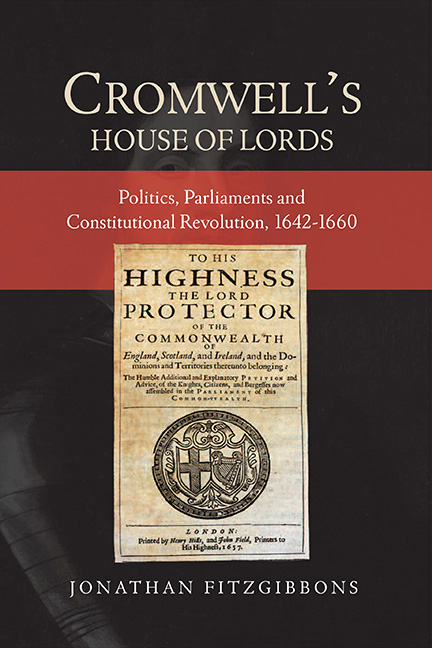Book contents
- Frontmatter
- Contents
- Acknowledgements
- Abbreviations
- Introduction
- 1 Parliamentarian Thought and the Abolition of the House of Lords, 1642–49
- 2 Oliver Cromwell, the Other House and the Humble Petition and Advice
- 3 The Membership of the Other House
- 4 The Other House and the Second Session of the Second Protectorate Parliament
- 5 Richard Cromwell, the Third Protectorate Parliament and the Other House Debates
- 6 The Other House, the Army and the Search for a Settlement
- Conclusion
- Appendix: The Membership of the Other House
- Bibliography
- Index
- Studies in Early Modern Cultural, Political and Social History
- Frontmatter
- Contents
- Acknowledgements
- Abbreviations
- Introduction
- 1 Parliamentarian Thought and the Abolition of the House of Lords, 1642–49
- 2 Oliver Cromwell, the Other House and the Humble Petition and Advice
- 3 The Membership of the Other House
- 4 The Other House and the Second Session of the Second Protectorate Parliament
- 5 Richard Cromwell, the Third Protectorate Parliament and the Other House Debates
- 6 The Other House, the Army and the Search for a Settlement
- Conclusion
- Appendix: The Membership of the Other House
- Bibliography
- Index
- Studies in Early Modern Cultural, Political and Social History
Summary
On 25 April 1660, over eleven years since its last sitting, the House of Lords returned. Among those ten parliamentarian peers who took their seats that day were three who had refused to act upon their summons to Cromwell's Other House: Manchester, Saye and Wharton. Yet, it seems that, like those second chambers proposed in 1659, this ‘restored’ House of Lords was envisaged merely as a bulwark for a faction. The Act that brought the Long Parliament to an end and summoned the Convention Parliament to meet defended the ‘House of Peers (consisting of those Lords who did ingage in the Cause of the Parliament, against the Forces raised in the name of the lake King, and so continued untill One Thousand six hundred fourty eight)’. Writing to Hyde just days before the parliament assembled, John Mordaunt believed that only those lords who remained faithful to parliament in 1648 would be allowed to sit. He also believed that this ‘Cabal’ would insist upon the terms of the Newport Negotiations of 1648 as the basis for Charles II's restoration. If true, the parliamentarian peers who assembled on 25 April envisaged the restoration of the House of Lords along the same lines as the old Presbyterians in the third Protectorate Parliament. That is, they wanted a House of Lords grounded firmly upon the ideas and proposals of the 1640s, rendering void all peerages bestowed since May 1642 and ensuring that all future peers had the approval of both Houses before sitting and voting in the Lords. As in 1648, they intended not a return to the chamber that sat before 1642, but a chamber dominated by the old parliamentarian peers and supervised by the Commons.
Yet if the parliamentarian peers believed they could control the terms of the Restoration they miscalculated. When, after a brief adjournment, the peers resumed their sitting on the afternoon of 25 April they found that the earls of Middlesex, Dorset and Rivers had slipped past Monck's soldiers and entered the chamber. All three had succeeded to their peerages during the 1650s and, more alarmingly for the parliamentarian peers, the latter two were the sons of Royalists.
- Type
- Chapter
- Information
- Cromwell's House of LordsPolitics, Parliaments and Constitutional Revolution, 1642–1660, pp. 230 - 238Publisher: Boydell & BrewerPrint publication year: 2018



